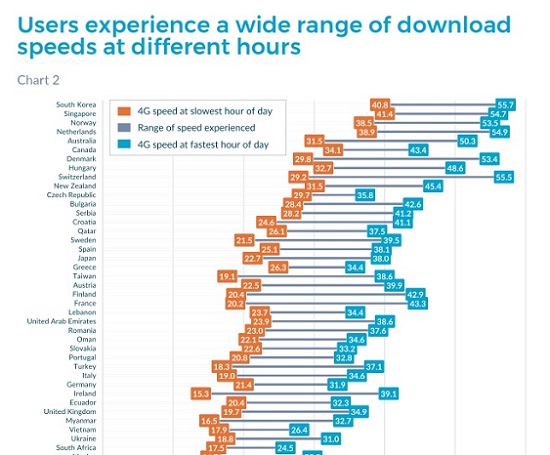
LONDON, UK — In its latest global research report, focused on how 5G will solve the congestion problems of today’s 4G networks, mobile analytics company Opensignal found that Canada’s 4G networks are currently among the fastest and most consistent in the world.
Overall, today’s global 4G networks tend to suffer from huge fluctuations in speed throughout the course of the day, Opensignal said. In its The 5G Opportunity: How 5G will solve the congestion problems of today’s 4G networks report, Opensignal analyzed the extent to which 4G download speeds drop when most people are awake, using their smartphones and wanting a great mobile data experience. Depending on the country, the 4G download speed a user experiences at one hour could be as much as 30 Mbps (megabits per second) faster than speed experienced just a few hours later, Opensignal said.
The most consistent of the 77 countries studied by Opensignal included several established 4G powerhouses in Asia and Europe, such as South Korea, Singapore, Czech Republic, Greece, Norway and Netherlands, as well as South Africa, Qatar and Canada.
Looking at Canadian 4G networks specifically, according to Opensignal’s analysis, the average 4G download speed at the slowest hour of the day in Canada is 34.1 Mbps, while 4G download speeds at the fastest hour of the day averaged 43.4 Mbps in Canada.
In comparison, highest-ranking South Korea reached a peak 4G download speed of 55.7 Mbps during the fastest hour of the day, while the country’s average speeds dipped down to 40.8 Mbps at the slowest hour of the day, according to Opensignal’s research.
Some countries were better than others when it comes to delivering the full capacity of their 4G networks to their customers on a consistent basis, Opensignal said. Canada, Czech Republic, Greece, Netherlands, New Zealand, Norway, Qatar, Singapore, South Africa and South Korea all have little variation in speed despite being at varying stages of 4G development, according to Opensignal.
Opensignal found in its analysis that Canada does an excellent job delivering the full capabilities of its network from hour to hour. There was very little difference between Canada’s most optimized connections and its average speed, putting it not only among the fastest countries in Opensignal’s analysis but also the most consistent. In comparison, the US landed in the middle of Opensignal’s consistency rankings of the 77 countries studied.
However, across the day, 42% of the 77 countries included in the study experienced speed variations of two times or more, and even the fastest 4G countries will need 5G to counter big drops in speeds at busy times in the future, Opensignal said.
“5G will add new capacities to help with these wide time-of-day speed variations,” Opensignal wrote in its report. “5G won’t just deliver faster speeds. 5G will provide a blanket of capacity, built using new high-bandwidth, high-frequency spectrum bands that will help mitigate the daily cycle of congestion we see on today’s 4G networks. These 5G services will support more simultaneous users at very fast speeds.”


